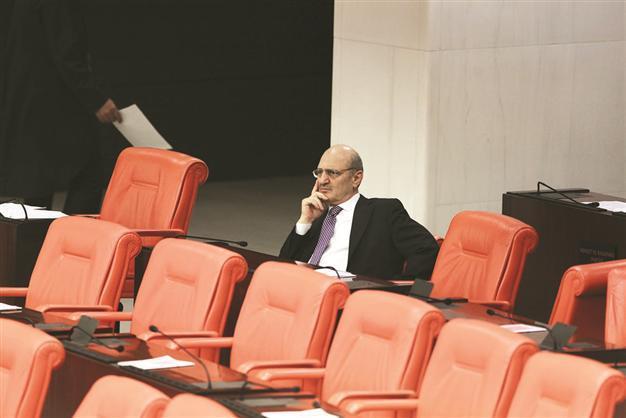D-Day arrives for graft debates at Turkey’s Parliament
Nuray Babacan ANKARA

Former Urbanization Minister Erdoğan Bayraktar sits in his seat in Parliament. Bayraktar is among the four former ministers facing graft charges. The summary of proceedings were first debated in the Parliament in a heated session on March 19, 2014. DHA photo
Parliament will gather today for a long-delayed session, during which summary of proceedings for four ex-ministers of Turkey’s ruling Justice and Development Party (AKP) facing graft charges will be debated.The session comes after a one-and-a-half month delay due to the local elections held on March 30 and also a procedural flaw in the related motions.
Meclis TV, Parliament’s live television station, does not broadcast on Mondays. However, all three opposition parties – the main opposition Republican People’s Party (CHP), the Nationalist Movement Party (MHP) and the People’s Democracy Party (HDP) – represented at Parliament separately appealed to the Parliament Speaker’s Office last week to have the station broadcast, in order to allow people to follow the extraordinary debates.
People will be able to follow the closed-circuit television live broadcast at www.tbmm.gov.tr.
The CHP has filed four separate motions for an inquiry into former Economy Minister Zafer Çağlayan, former EU Minister Egemen Bağış, former Interior Minister Muammer Güler and former Urbanization and Environment Planning Minister Erdoğan Bayraktar. The ruling AKP filed only one motion for an inquiry into the four.
Çağlayan, Güler and Bayraktar resigned days after the eruption of the huge corruption scandal on Dec. 17, 2013, when the police detained their sons and businessmen close to Prime Minister Recep Tayyip Erdoğan. Bağış was replaced by Erdoğan as part of a major Cabinet reshuffle on Dec. 25. All four ex-members of the Cabinet deny any wrongdoing.
Hurly-burly looms
The ruling AKP, which held a series of meetings at the Prime Ministry with lawyers and former ministers ahead of the session in order to name speakers and draft defenses, sent letters to all of its deputies warning them to be present at the session.
The party administration will hold a breakfast meeting with the deputies ahead of the session, which will be held in the afternoon and is likely to extend past midnight, as at least 10 hours will be required for the reading out and voting on each motion.
Turkey’s Parliament holds 550 seats and the AKP holds 313 of them. As it holds a simple majority, the AKP will be able to get the CHP’s four motions rejected at the General Assembly session, while getting its single commission proposal approved.
When will the commission be founded?
The opposition is highly critical of the ruling party’s plan for the founding of a single inquiry commission.
Meanwhile, the AKP has been examining remarks delivered by opposition lawmakers concerning the graft probe, and is prepared to argue that those lawmakers who have earlier publicly expressed a conviction about the probe cannot become members of the future inquiry commission. This argument is based on an article of Parliament’s internal regulations.
The to-be-founded inquiry commission will begin working in the second half of May. Its tenure will continue for four months, but as Parliament is set to enter summer recess as of July 1, it will not be able to finalize its work by that time.
The commission is also expected to give a break to its work due to upcoming presidential elections in August and restart work in October. After it finalizes its work, the secret voting on whether the four will be sent to the Supreme Council will be held at the General Assembly. At least 276 votes are required for that to happen.
The rumor is that the AKP will then vote in favor of sending them to the Supreme Council, which is the name that the Constitutional Court takes when it tries ministers and senior members of the judiciary. Many suggest that the prevailing political environment will be decisive in the decision then taken by the Supreme Council.
















